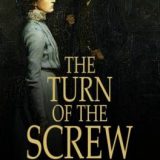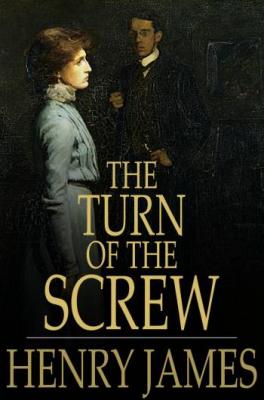The Turn of the Screw – Henry James – 1898
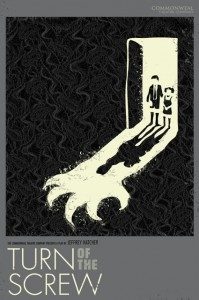
Posted by Joffre on 16/6/2013, 16:24:41
After reading The Beckoning Fair One, which I found okay, I read a book called How to Read Literature by Terry Eagleton. I found that an informative and interesting book. In it, Eagleton mentioned, while talking about unreliable narrators, that the governess in TotS is almost certainly insane. I had read TotS something like six years ago, but I didn’t remember much about it, so I decided to read it again.
I’m a little over halfway through now, and I feel that ‘almost certainly’ is stating the case much too strongly. A quick look on Wikipedia informs me that there is a long standing debate about whether the governess is insane or there are actual ghosts. I had thought myself through the bit of the debate that can be read there. If she is insane, how does she know so well what Quint looks like? She could have learned in any number of ways. But shouldn’t there be some suggestion of one of those ways in the text? The last question is mine. I don’t know the answer.
I enjoyed the Eagleton book. It seems like the kind of thing I should have been taught while getting a degree in literature. More and more, I feel I’ve been taught nothing.
~
Posted by Joffre on 17/6/2013, 12:12:35, in reply to “The Turn of the Screw”
Finished TotS this morning.
What do I make of this governess? I see no especially good reason to say she’s insane, but I am tempted by the idea. I find more interest in insanity than in ghosts. She does seem a bit odd. Sometimes the manner of her speech seems exaggerated or something. But then everyone in this story is rather odd. The children, Miles especially, don’t seem at all child like. Why wouldn’t Mrs. Grose contact someone if the governess seemed to be insane. Surely the master could be bothered for that. Surely the bailiff, who makes no appearance, would look in to see what was going on.
I read some stuff online. Edmund Wilson’s statement of the case for the insane governess seems much too clever to me. The ghosts are manifestations of the governess’s repressed sexual desire? Peter Quint is the master transposed to a social position beneath the governess. Miss Jessel is the governess in the position she wants to be? Egad.
I read an interesting idea in some student’s paper. It was that the governess was not overly excited about anything until Mrs. Grose claimed that the features of the man seen at the window were those of the dead Peter Quint. That the governess was lying to cover up the presence of secret inhabitants of the house. The story makes a reference to Jane Eyre where that is, of course, the case. I suppose there must be reasons for dismissing this idea. It doesn’t seem to have gotten much attention.
~
Posted by guillermo maynez on 17/6/2013, 16:13:03, in reply to “Re: The Turn of the Screw”
It’s fun to ponder these things and try to come up with a straight answer about the governess’s situation, but in the end that’s exactly what James wanted. I’m afraid the mystery will remain in the dark for ever, and hopefully attentive readers like yourself will for many years try to discover the “truth” about the supposed or real ghosts haunting the old manor where two very strange kids live…
~
Posted by Joffre on 29/6/2013, 10:33:59, in reply to “Re: The Turn of the Screw”
For me, the most likable James novel by far is Washington Square, which James himself claimed to dislike. I haven’t disliked any I’ve read, but The Wings of the Dove was the hardest for me.
I’m glad you’re enjoying TotS.
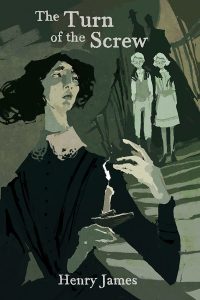
Posted by Lale on 1/7/2013, 19:36:15, in reply to “Re: The Turn of the Screw”
I finished the book. In spite of James’ peculiarities (dialogs are so cryptic that I feel like I am just eaves dropping on people at a cafe without having a clue of the context of their conversation) I quite enjoyed the book. It was unpredictable and original. Also quite “scary” meaning I am not scared scared but it certainly makes your heart race.
Here is my take on it: The governess is most certainly mad. A nice woman but crazy. I think for anyone who does not believe in ghosts, this is the natural conclusion. So, if we agree that there were no ghosts in that house, then we are left with two possibilities with respect to the children. They were either
– driven to a nervous breakdown and to death,
or
– they were simply unaware of what was going on in the mind of the governess and her discussions with Mrs. Grosse, and they were just minding their own business. Whatever parts of their behavior that seemed related to the governess’ internal turmoil were purely coincidental.
Nobody other than the governess saw the supernatural happenings other than the governess. There were a few things that hinted at the possibility of others also being aware of such things (such as Mrs. Grosse’s fright when she saw the governess at the window, or the ability of the governess to accurately describe the two dead person) can be explained away easily by several plausible theories. If you see things that others don’t see, you are crazy. In this case, the governess’ madness harmed greatly the two children who were already vulnerable by their situation (orphans, the only relative refuses to show any affection etc.)
Miles may have been discharged from the school for all sorts of reasons. He may have been turned out for having a health issue (maybe even a heart problem.) Nobody inquired, therefore nobody knows. The woman’s theatrics finally killed the boy.
That’s what I think. Waiting for your comments on my comments.
Lale
~
Posted by Joffre on 2/7/2013, 10:20:14, in reply to “Re: The Turn of the Screw (Spoiler)”
Well, the main thing here is that it doesn’t matter at all whether or not one believes in ghosts. They exist beyond doubt in many works of fiction. Not that it matters much, but James wrote other ghost stories. One of Edmund Wilson’s original arguments for the insane governess theory was that this story was not part of whatever collection included James’s unquestionable ghost stories. One of the objections to Wilson’s argument was that it simply represented an unwillingness to make the necessary suspension of disbelief. Apparently one of the major competing theories is a religious interpretation that sees Quint and Jessel not as ghosts but as some kind of hellish presences. This interpretation focuses much on the duration of the events and such as that.
If you see things others don’t see, you are crazy, or you are clairvoyant. Again, however you feel about that in ‘real life’, it’s quite possible in novels.
Your idea about Mile’s possible heart condition is a nice one.
As I said before, I actually prefer the insane governess story. I just wish I could see a little more to support it. It seems to rest almost entirely on the ‘fact’ of ghosts not existing in the ‘real world’ and perhaps on the fascination of the interpratation. Is there anything in the text itself to suggest the governess is insane rather than seeing ghosts? What can we make of the frame story? The frame story presents the governess’s tale as a ghost story. People are sitting around telling ghost stories.
Part of me wants to read this again. I am curious to see if I can find one solid clue to her insanity. But while I am very intrigued, I don’t believe I enjoyed the story as much as you. I’m glad you enjoyed it.
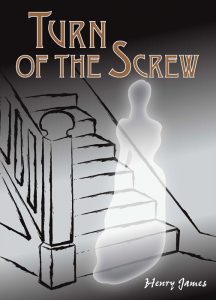
Posted by Lale on 2/7/2013, 12:27:11, in reply to “Re: The Turn of the Screw (Spoiler)”
: Well, the main thing here is that it doesn’t matter at
: all whether or not one believes in ghosts. They exist
: beyond doubt in many works of fiction.
…
: If you see things others don’t see, you are crazy, or
: you are clairvoyant. Again, however you feel about
: that in ‘real life’, it’s quite possible in novels.
Yes, I agree, in some novels supernatural happenings exist beyond a doubt, it is the reality of that novel. For instance, in this year’s book “The Monk” all sorts of supernatural things will happen but they are the reality of the world of that book.
This novel, however, does doubt the ghosts and they are not part of the universe of the characters and the events. The characters don’t normally believe in ghosts, they are shocked, they are doubtful themselves. Mrs. Grosse is a simple woman (doesn’t know how to read and write) and the educated woman is telling her that she has seen a dead person as if he he was alive. Mrs. Grosse believes her. But even these two know that this is something outrageous. For this reason I think that they have the same standards we, you and I, have today. That’s why only explanation left to me is that these people were imagining things, seeing things, reading into things … The governess becomes obsessed. I think it is fair to conclude that she was crazy.
In The Monk for instance ghosts are appearing and many many people are seeing them and they are part of life. I didn’t think all the characters in the Monk were crazy because they believed in ghosts. The ghosts were really there.
Take the Exorcist for example (in my opinion best scary movie ever made, and recently we watched an uncut version on DVD, my goodness, no wonder they left those scenes out of the theatre version.) In Exorcist, based on the reality of the story, there is devil in the body of the real girl, and two priests die trying to perform an exorcism. That is the reality of the story, I don’t think the little girl, the mother, the maid and the servant and the two priests were crazy.
Lale
~
Posted by Joffre on 3/7/2013, 11:55:03, in reply to “Re: The Turn of the Screw (Spoiler)”
It isn’t necessary that all the characters see or believe in ghosts for them to be real. I haven’t read a lot of ghost stories, but my impression is that ghosts usually appear to specific people. Something I read about this argument mentioned that there is a long literary history of ghosts appearing to some people and not others. The only examples mentioned were from Shakespeare: Hamlet, Julius Ceasar, and Macbeth. I don’t know Shakespeare so well, but I’ll take that guys word for it. I do know of that movie where the kid sees dead people. I never saw it, but if it’s such a big deal that he sees them, I assume not everyone does. There is the Nabokov short story The Vane Sisters where the narrator smugly affirms the absurdity of such things while we, the readers, see that ghosts have put his words in his head. I don’t see at all that this novel doubts the existence of ghosts. I do think it’s possible the governess is insane. I wish I saw more to suggest that, but I suppose that would destroy the ambiguity.
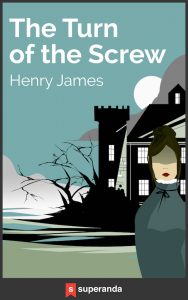
Posted by Lale on 3/7/2013, 13:28:35, in reply to “Re: The Turn of the Screw (Spoiler)”
: It isn’t necessary that all the characters see or
: believe in ghosts for them to be real.
You are right, I want to correct myself. It isn’t necessary for all the characters to see the ghosts or whatever supernatural things that are happening. And you have nailed it on the head with the example of the “I see dead people” movie (the title is actually “Sixth Sense” but the phrase “I see dead people” really did catch on). So, I will re-phrase want I wanted to say, the ghost thing (or any other weird thing) must be real in the universe of the story (book movie). I don’t we can accept the Turn of a Screw as a story in which the non-natural things were valid/true for that story. The reader doubts it. I doubt it. The author makes it ambiguous enough to make us doubt. Whereas in the movie Sixth Sense, we have plenty of proof that the kid is really seeing dead people. The audience does not think the kid is crazy (a little messed up, for sure, due to the weird experience, so he can be called a little crazy, but not in the sense that he is seeing things where there is nothing to be seen, no illusion, no making up).
: I don’t
: see at all that this novel doubts the existence of
: ghosts.
I think it does, but I can see how other readers may feel differently.
: I do think it’s possible the governess is
: insane. I wish I saw more to suggest that, but I
: suppose that would destroy the ambiguity.
Yes, the ambiguity was the most beautiful part of the book. Excellent read. I am so happy I read it. Now I will read Shirley Jackson’s Haunted Hause.
Lale
~
Posted by Joffre on 3/7/2013, 20:52:48, in reply to “Re: The Turn of the Screw (Spoiler)”
The Haunting of Hill House? I’m actually planning to read that sometime soon too.
~
Posted by Lale on 4/7/2013, 13:46:07, in reply to “Re: The Turn of the Screw (Spoiler)”
Yes, that’s the one.
Lale
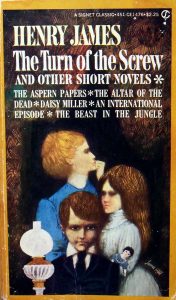
Posted by Lale on 2/7/2013, 9:39:45, in reply to “Re: The Turn of the Screw”
: where two very strange kids live…
The kids may not be that strange at all. I seem to think they were just like other kids. The differences from other kids may be due to their being orphans with no one in the world, other than one another, who cares for them.
I do believe that the kids occasionally played tricks on their governess, but that’s what most kids do. The kids probably figured out the strangeness of their governess early on. They must have sensed that she was seeing illusions and making, or trying not to make references to things that did not exist. So the kids may have occasionally tried to spy on her or play with her a little. Or maybe not even that. Either way, I don’t think they were all that different from all those kids of the time, in Britain, who were being raised in large homes with governesses.
Lale
~
Posted by Joffre on 2/7/2013, 9:51:46, in reply to “Re: The Turn of the Screw”
What I meant about the strangeness of the kids was mostly the extremely adult way Miles seems to talk with the governess. He calls her my dear and his tone seems so… I don’t know… something like a psychologist. At this moment, though I didn’t get this impression while reading, it strikes me as being something like the tone of Lord Henry in Dorian Gray. Possibly I’ve made this connection because I’ve been reading a simplified Dorian Gray with students. Anyway, what I feel is that Miles has an air of sapience, an air of knowing something, that doesn’t seem at all childlike to me.
As I mentioned before, though, everything is reported through the governess, so perhaps the portrait of Miles is misleading.
~
Posted by guillermo maynezEmail User on 2/7/2013, 11:27:08, in reply to “Re: The Turn of the Screw”
Or perhaps for us raised elsewhere, the formality or even the pedantry of a British high-class, XIXth century, privately-educated boy is hard to believe…
~
Posted by Lale on 2/7/2013, 12:11:53, in reply to “Re: The Turn of the Screw”
Yes, that’s exactly what I think, I was typing my note when you posted this.
Lale
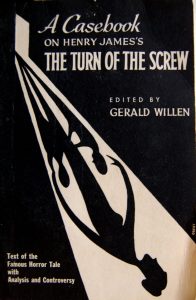
Posted by Lale on 2/7/2013, 12:09:30, in reply to “Re: The Turn of the Screw”
Yes, everything is told from the point of view of the governess. That is the most important thing we must keep in mind.
I think she was reading into things when it came to the behaviour of the children. At the end Flora had a temper tantrum. I think she just had a breaking point when her loneliness in the world, lack of familial affection, triggered by the challenging attitude of her governess caused the kid to break down.
: mostly the extremely adult way Miles seems to talk
: with the governess. He calls her my dear and his tone
Remember these are high-society Brits in the olden times. Those well-educated children, combined with the standard English propriety and polite manners, did speak like adults. Maisie from “What Maisie Knew” also spoke like that. “My dear” from a kid to a tutor sounds very weird to our ears but I don’t think it was that unusual for them.
Lale
~
Posted by guillermo maynez on 4/7/2013, 11:45:01, in reply to “Re: The Turn of the Screw”
One of the many successes of the book is that James managed to be sufficiently ambiguous about the reality or fantasy of the ghosts, that we keep on discussing it many years after. It is all the same when people, in full XXI century, talk about “premonitions” or ghosts: Are these phenomena real, and only not yet reached by science? Is there any basis for some kind of permanence of some kind of substance after we die? My rationality tells me there is none, but current scientific thought and discovery can only claim it hasn’t been found as yet. Or are these phenomena happening only within people’s minds, and are they crazy or simply have different perceptions, be them real or totally imagined? Neurophysiology is one of the most exciting and intriguing realms of research today, and many of our thinking about our minds may change very soon.
For the time being, the governess seems to be completely nuts…
~
Posted by Lale on 4/7/2013, 14:08:37, in reply to “Re: The Turn of the Screw”
: One of the many successes of the book is that James
: managed to be sufficiently ambiguous
Yes, I think that was really brilliant. I think that’s why we all liked the book.
Lale
The artwork on the covers of various editions are fantastic:


